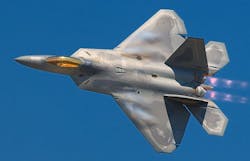Air Force researchers ready major cyber security project to safeguard avionics from computer hackers
Officials of the Air Force Research Laboratory at Wright-Patterson Air Force Base, Ohio, issued a notice Wednesday for the upcoming Avionics Vulnerability Assessment Mitigation and Protection (AVAMP) program, which seeks to find ways of protecting avionics from cyber attack.
A formal solicitation for the AVAMP program is expected by the end of June. The program will involve two or more contractors and will be worth as much as $49.7 million, Air Force researchers say. Contract awards are expected by next November.
AVAMP will investigate and develop methodologies, tools, techniques, and capabilities to identify susceptibilities and mitigate cyber vulnerabilities of avionics systems. Research will focus on embedded system cyber security technologies involving vulnerabilities from physical, remote, and supply chain access.
The program's scope will include manned and remotely piloted vehicles; on-board intelligence, surveillance, and reconnaissance (ISR) systems; munitions; and any equipment, component, or subsystem that could compromise Air Force weapons.
Related: Safety- and security-critical avionics software
Avionics cyber security technologies developed in the AVAMP program should be able to interface and interoperate with anti-tamper and open avionics system architectures and apply to a wide-range of aircraft that operate in contested environments involving electronic warfare (EW) systems, space systems, and mobile devices.
For this project Air Force researchers want to develop automated tools to support avionics vulnerability assessments; automated reverse engineering, program understanding, and software assurance tools to identify and detect weaknesses in avionics; malware detection tools and countermeasures; and techniques to detect, respond, and adapt to never-before-seen types of cyber attacks.
For technical questions and concerns contact the Air Force's Lisa Jones, the AVAMP program manager, by email at [email protected], or by phone at 937-528-8018.
For contracting questions or concerns contact Maureen Grandon, the AVAMP contract specialist, by email at [email protected], or by phone at 937-713-9959.
More information is online at https://www.fbo.gov/spg/USAF/AFMC/AFRLWRS/BAA-RQKS-2015-0008/listing.html.
